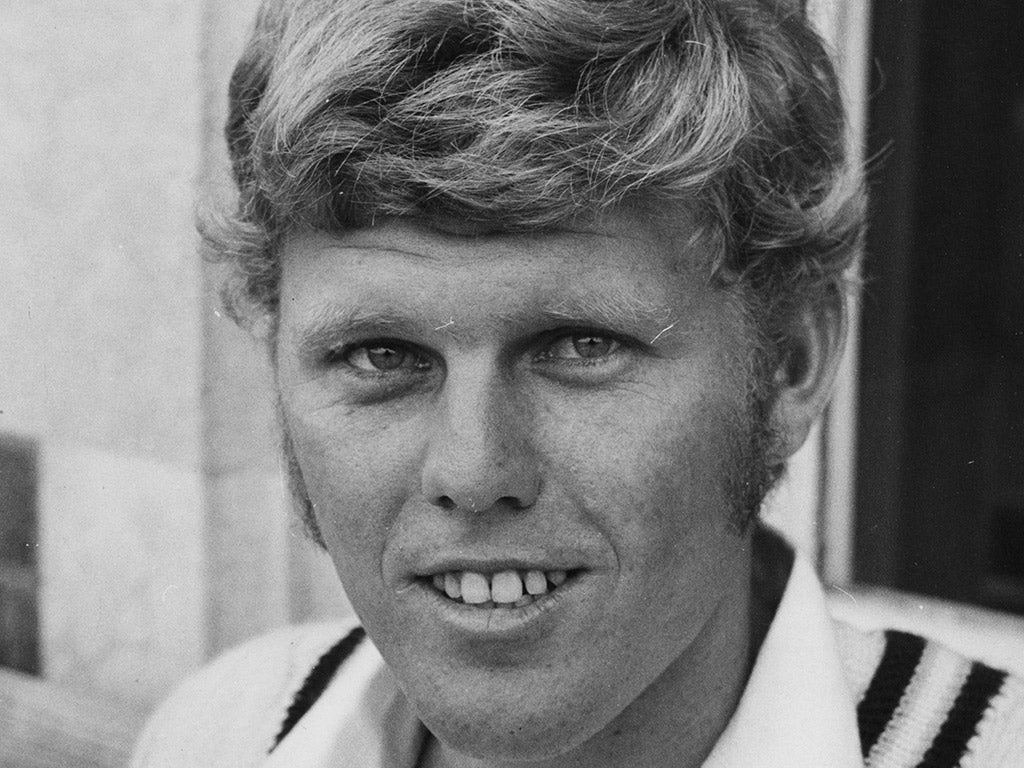Barry Richards: The South African great lost to Test cricket and forgotten in his country
He thrilled crowds but played in apartheid era

Mention the batting feats of Barry Richards in the presence of Hampshire supporters of a certain vintage and there will be a hushed reverence in honour of his achievements. In his home country of South Africa his name will be greeted with a similar silence – although this one will be more awkward.
For some the former South Africa opener is up there among the game’s all-time greats. Despite playing just four Tests for his country in their last series before they were banished from the international cricket community, Richards’ batting in county cricket lit up the 1970s for a domestic audience spoilt for choice for overseas talent.
Batting alongside Roy Marshall, then Gordon Greenidge, he played some of the most astonishing innings ever witnessed on English soil.
He also shone for South Australia – once scoring 325 in a single day in a Sheffield Shield match against Western Australia in 1970-71 – and in World Series Cricket, where he finally had the opportunity to test himself against the best bowlers in the global game at the end of that decade.
In South Africa, though, the presence of Richards and others from that great South African side, including Mike Procter, Graeme Pollock and Lee Irvine, is viewed more as an irritant than an inspiration to current or future generations. Their faces are likely to be missing from the stands for the majority of England’s forthcoming Test series against Hashim Amla’s men.
These players are in an invidious position. They clearly had nothing to do with the formulation of an odious apartheid policy that barred anyone who wasn’t white from playing for the national team, but they were, in many ways, seen as the country’s poster boys during one of the darkest periods in its history.
Now, almost 25 years after returning to the international fold, they have been widely cast aside by Cricket South Africa (CSA), a governing body intent on ensuring the nation’s cricket team is truly representative of the country in the post-apartheid era – and doing all it can to disassociate itself with the past.
“There are quite a few CSA functions throughout the year but we’re not invited to any of them,” Richards tells The Independent. “I know through the breweries that there was some talk of an invite but nothing ever materialised – there’s a bit of ‘them and us’. It’s sad but that’s the way it is. Our time has come and gone. It’s not worth losing a lot of energy about – if they want to behave like that then that’s fine.”
For many in the new South Africa, the governing body’s stance is understandable. After all, for all the opportunities offered to Richards, Pollock and Procter, there were black cricketers who were denied the chance to make a living playing the game they loved. From a sporting perspective, though, it seems churlish to ignore the contributions that these undeniably great players made.
It also appears to have been widely overlooked that Richards and his colleagues staged a walk-off in a match between Transvaal and the Rest of South Africa at Newlands in Cape Town in April 1971 in a bid to soften the government’s stance in the run-up to their 1971-72 tour to Australia.
The government-sponsored match offered a perfect opportunity for them to voice their opposition to apartheid.
The South African cricket board eventually picked two black players for the tour, Dik Abed and Owen Williams, but John Vorster’s government refused to accept their selection. The two players in question also, unsurprisingly, refused their call-up.
“It’s a generational thing,” says Richards. “It’s 1992 onwards. Everything that happened before doesn’t exist.”
Richards will be in Cape Town for the second Test which begins on 2 January, but he is unlikely to attend the other three Tests.
His playing career is long behind him but the memories of his brief appearance in the Test arena still burn brightly. In that 4-0 win against the Aussies – South Africa’s first Test series since 1967 and their last until 1992 – Richards scored 508 runs at an average of 72, slightly behind Pollock, who amassed 517 at 73.
“I still look back on it very fondly,” he says. “I don’t think you realise at the time that it was going to be my last. You always felt that although there were a few storm clouds gathering, you knew that, you didn’t think you were going to be sitting out 21 years.”
The final triumph of that generation is now consigned to history – and plenty in South Africa believe that is where it should stay.
Join our commenting forum
Join thought-provoking conversations, follow other Independent readers and see their replies
Comments
Bookmark popover
Removed from bookmarks